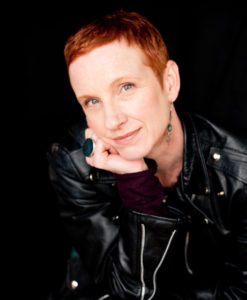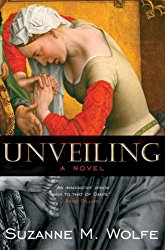Can you share a little about your recent book –
My most recent book, published in January 2016 by Harper Collins Christian, is called The Confessions of X. It is a historical fiction about St. Augustine of Hippo’s concubine. The story follows her from childhood to young womanhood, when she first met Augustine, then through her common-law marriage with Augustine, the birth of their son, and beyond. The novel received Christianity Today’s Book of the Year Award for 2017.
My first novel, Unveiling, is being republished by Paraclete Press in the spring of 2018. It’s the story of an art conservator, Rachel Piers, who is sent to Rome by her New York museum to restore what is believed to be a lost medieval masterpiece. The story is about what happens to Rachel as she slowly uncovers—unveils—the painting, and how what she finds changes her life. Unveiling won the Award of Merit from the Christianity Today book awards.
Why do you write? Do you have a theme, message, or goal for your books?
That’s a hard one to answer because from a very young age, I have always wanted to write stories.
I don’t believe that art is a vehicle merely for conveying a “message” as if it is only the message that counts and not the story itself. The “felt life” that fiction seeks to incarnate is too complex and too rich to be reduced to concepts or ideas. My ultimate goal is that the finished artefact is “real” as far as human experience and emotion is concerned and that the historical setting is authentic. It is the humanity of the characters that I care about. I would be just as interested in portraying an atheist as I would a person of faith for even the atheist reveals man’s hunger for the divine.
How long have you been writing? And how long did it take you to get your first major book contract?
I have been writing for as long as I can remember and publishing novels for 20 years or so, give or take, although my output has been meager considering the fact that I have raised four children and worked as a professor of English at various universities during this time.
I am now able to write full time and I have two novels coming out in 2018. My first novel, Unveiling, sat in a drawer for ten years until Paraclete Press picked it up. The second edition of Unveiling is forthcoming from Paraclete in spring 2018.
How long does it take you to write a book?
That really depends on what the novel is about. Unveiling is a contemporary novel set in present day Rome and so the research only involved medieval painting and conservation techniques.
The Confessions of X is set at the end of the Roman Empire in the fourth century. I had to research not only the time period but also Augustine’s works. As he was the most prolific writer of the ancient world, this took a long time—four years of research and four years of writing the novel.
I have another novel coming out in August 2018 by Crooked Lane Books and this one is set in Elizabethan times—1580s London. This has taken me less time to research mostly because I am not researching the writings of a certain historical figure but only the times. It is the first in a murder mystery series set at the court of Elizabeth the First.
What’s your writing work schedule like?
I’m pretty disciplined as I have found that my Muse tends towards indolence if I don’t keep her in check. Writing only when inspiration strikes is a very haphazard affair, at least for me. When my children were small, I used to write at night but now they are grown, I prefer the mornings. I like to write every day for four to six hours. More if I am on a deadline. I have friends who have a beautiful house on Orcas Island and they have been gracious enough to allow me to stay there over the years and write. When I am there I am able to write ten to twelve hours a day.
Do you have an interesting writing quirk? If so, what is it?
I don’t think so unless it’s re-reading what I wrote the day before and going over it before I start writing anything new. Not a very interesting quirk.
What has been your greatest joy(s) in your writing career?
My greatest joy is the act of writing itself. There is nothing like being totally absorbed in the world of a novel, in the life of its characters.
What has been your darkest moment(s)?
My darkest moments come after the novel is published and I fear that the novel will never be read by anyone. I can’t bear to think that no one but me will ever come to know the characters. That is because the act of writing makes me come to love them. I want others to love them too.
Which of your books is your favorite?
That’s an impossible question to answer. It’s a bit like asking a mother which child she loves the best. All my novels are my favorites in that I love all my characters.
Who is your favorite author to read?
I have several and they are so different: Sigrid Undset, Marguerite Yourcenar, Patrick O’Brian, Hemingway, Melville, Flannery O’Connor, Virginia Woolf, Jo Nesbo, Dennis Lehane, Joseph Kannon. But if I have to pick one, I would choose Cormac McCarthy.
What advice can you give aspiring writers that you wished you had gotten, or that you wished you would have listened too?
Keep writing. It’s not about publishing a novel, it’s about the craft of writing a novel. Keep reading. Only reading the works of others will replenish the creative reservoir.
How many times in your career have you experienced rejection? How did they shape you?
Quite a few. Rejection taught me to persevere. It taught me the difference between being a writer and being an author and that the first is what counts.
Do you have a favorite character or scene in one of your books?
The concubine (“X”) in The Confessions of X. She is a strong and loving woman who suffers greatly but is not destroyed by tragedy. My favorite scene in the novel is the last chapter where she is reunited with Augustine in Hippo Regius in AD 430.
Where do you get your ideas?
I don’t really have ideas so much as I “see” characters and scenes. When I was twelve and at Loreto Convent School in Manchester, England, we were reading Augustine’s Confessions. I remember putting up my hand and asking Sister Bernadette who the mysterious woman was that Augustine referred to as “Una”—the One. She told me that no one knew, that his concubine had been “lost to history.” This phrase stuck with me and forty years later, I decided to find out who she was. Over the years, she has been a mysterious presence on the periphery of my imagination.
In Unveiling, my protagonist, Rachel Piers, and the novel’s plot emerged from the synthesis of two paintings I used to go and look at in the National Art Gallery in Washington, DC: a modernist portrait of a woman by Modigliani and a late medieval religious triptych by Rogier Van der Weyden. The portrait showed a woman who was sad; the triptych showed the grief of Mary, the mother of Jesus, and Mary Magdalen weeping at the foot of the cross. Somehow the grief of these women from different centuries fused. Although I didn’t understand it at the time, I think Unveiling seeks to understand and heal grief.
What are common mistakes you see aspiring writer’s make?
They confuse being an author with being a writer. An author publishes books; a writer writes. I believe that the love of words and the craft of writing itself has to come first. Being published and becoming known as an author is a by-product of writing rather than the reason for writing.
Where/How do you recommend writers try to break into the market?
Given the polarized state of our culture, breaking into a market is very, very hard to do. Having a good agent is a must but, after that, there is not much a writer can do except write the stories that they know in their bones. Trying to conform to a market which is constantly shifting with the fashion can be soul-destroying as well as talent-destroying. The old adage “write what you know” is a good one.
Author website at www.suzannemwolfe.com
Suzanne M. Wolfe grew up in Manchester, England, and read English Literature at Oxford University. She is Writer in Residence at Seattle Pacific University and is the author of Unveiling: A Novel (Paraclete Press, 2004), a second edition of which is forthcoming from Paraclete Press in Spring 2018. Her latest novel is The Confessions of X (HCC, 2016) which won Christianity Today’s Book of the Year Award for 2017. Twenty-five years ago, she and her husband, Greg Wolfe, co-founded Image Journal, a journal of the arts and faith. They have also co-authored many books on literature and prayer including Books That Build Character: How to Teach Your Child Moral Values Through Stories, (with William Kirkpatrick, Simon & Shuster, 1994) and Bless This House: Prayers For Children and Families, (Jossey-Bass, 2004). She has written numerous essays and blogs including This is My Body (Image Journal, issue # 64; The Spirit of Food, ed. by Leslie Leyland Fields, Cascade Books, 2010) and Smelling a Rat, (Good Letters, www.pantheon.com, Oct. 15, 2015). The first novel of a murder mystery series set in Elizabethan London is forthcoming from Crooked Lane Books in August 2018. She lives in Seattle, Washington.






No Comments